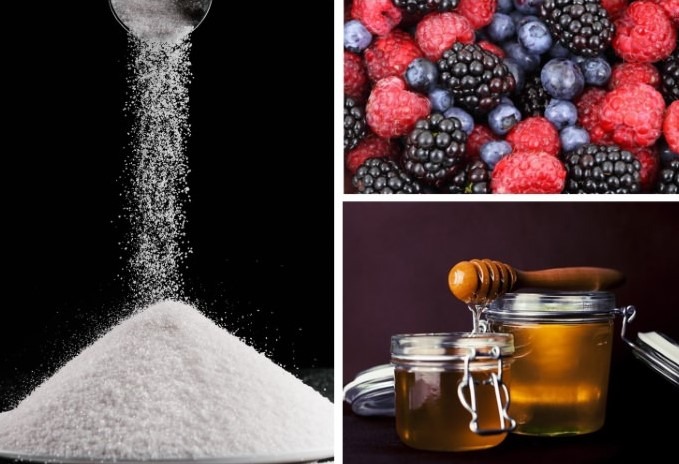Sugar is an essential component in many diets around the world, but not all sugars are created equal. When it comes to white sugar and natural sugar, there are significant differences in their production, nutritional content, and impact on health. Understanding these differences can help make more informed dietary choices.
What is White Sugar?
Production: White sugar, also known as refined sugar, is typically derived from sugar cane or sugar beets. The production process involves several steps:
- Extraction: The juice is extracted from the sugar cane or beets.
- Purification: The juice is purified to remove impurities.
- Crystallization: The purified juice is boiled to form sugar crystals.
- Refinement: The crystals are then washed, filtered, and sometimes bleached to produce the final product, which is pure sucrose.
Nutritional Content: White sugar is essentially pure sucrose, which is a disaccharide composed of glucose and fructose. It provides a quick source of energy but lacks vitamins, minerals, and fiber.
What is Natural Sugar?
Sources: Natural sugars are found in whole foods such as fruits, vegetables, dairy products, and some grains. These sugars include fructose (found in fruits), lactose (found in dairy), and glucose (found in various foods).
Production: Unlike white sugar, natural sugars do not undergo extensive processing. They are consumed as part of whole foods, retaining their original nutritional content.
Nutritional Content: Natural sugars come with additional nutrients that are beneficial to health. For example, fruits provide vitamins, minerals, and fiber along with fructose. Dairy products offer calcium and protein along with lactose.
Key Differences
- Processing:
- White Sugar: Highly processed, involving extraction, purification, crystallization, and refinement.
- Natural Sugar: Minimally processed, found in whole foods with their natural nutrients intact.
- Nutritional Value:
- White Sugar: Provides energy but lacks essential nutrients.
- Natural Sugar: Accompanied by vitamins, minerals, and fiber, which aid in digestion and overall health.
- Impact on Health:
- White Sugar: High consumption is linked to various health issues, including obesity, type 2 diabetes, and heart disease. It can cause rapid spikes and crashes in blood sugar levels.
- Natural Sugar: The fiber in fruits and the protein in dairy products help slow the absorption of sugar, leading to a more gradual rise in blood sugar levels. This can help maintain energy levels and reduce the risk of metabolic diseases.
Why You Should Care?
- Energy Levels: Natural sugars provide a more sustained energy release compared to the quick spikes and drops associated with white sugar.
- Nutrient Intake: Choosing natural sugars means you are also consuming essential nutrients that support overall health.
- Weight Management: Foods with natural sugars tend to be more satiating, helping control appetite and preventing overeating.
- Long-term Health: Reducing white sugar intake can decrease the risk of chronic diseases and support long-term health.
When discussing the relationship between white sugar, natural sugar, and diabetes, various experts have weighed in on the subject:
White Sugar vs. Natural Sugar: White sugar, also known as refined or table sugar, is heavily processed, typically derived from sugar cane or sugar beets. During the refining process, natural nutrients are removed, leaving behind pure sucrose. Natural sugars, on the other hand, are found in whole foods such as fruits, vegetables, and dairy. These sugars come with additional nutrients like fiber, vitamins, and minerals, which can help moderate their absorption and impact on blood sugar levels.
Impact on Diabetes and Blood Sugar: Dr. Robert Lustig, a professor of pediatric endocrinology, emphasizes that while both refined and natural sugars ultimately break down into glucose, their effects on the body can be quite different. Refined sugars can lead to rapid spikes in blood glucose levels, which can be particularly harmful to individuals with diabetes. Natural sugars, combined with the fiber in fruits and vegetables, result in a slower release of glucose into the bloodstream, helping to maintain more stable blood sugar levels (MD Anderson Cancer Center) (Mayo Clinic Connect).
Lindsey Wohlford, a wellness dietitian, explains that managing sugar intake is crucial for diabetes control. She highlights that natural sugars in whole foods are preferable because they come with essential nutrients that aid in better blood sugar management. In contrast, refined sugars offer no nutritional benefits and can lead to unhealthy spikes in blood sugar (MD Anderson Cancer Center).
Expert Opinions: Dr. David Ludwig, a professor of nutrition at Harvard, suggests that the rapid absorption of refined sugars can overwhelm the body’s insulin response, leading to insulin resistance over time, which is a precursor to type 2 diabetes. Consuming whole foods with natural sugars can help mitigate this risk due to their slower digestion and absorption rates (Mayo Clinic Connect).
Chris Gawarecki, a health commentator, notes that different types of carbohydrates can act like sugars in the body, particularly processed and refined carbs. These high-glycemic-index foods are quickly converted into glucose, leading to spikes in blood sugar. In contrast, whole foods provide sustained energy and are digested more slowly, which is beneficial for maintaining stable blood sugar levels (Mayo Clinic Connect).
While both white and natural sugars eventually break down into glucose, the source and form of the sugar play a significant role in how they affect blood sugar levels and overall health. Natural sugars, found in whole foods, are generally better for blood sugar management due to their slower absorption and additional nutrients. Conversely, refined sugars should be consumed in moderation, especially for individuals managing diabetes.
Conclusion
Incorporating natural sugars into your diet, while minimizing white sugar, can have significant health benefits. By choosing whole foods like fruits and dairy products, you not only satisfy your sweet tooth but also provide your body with essential nutrients that support overall well-being. Understanding the differences between white sugar and natural sugar is a crucial step towards making healthier dietary choices.
